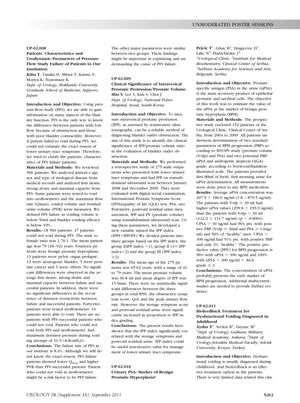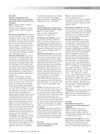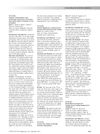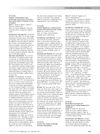Biofeedback Treatment for Dysfunctional Voiding Diagnosed in Adulthood
September 2011
in “
Urology
”
biofeedback treatment dysfunctional voiding lower urinary tract symptoms pressure-flow study bladder capacity detrusor overactivity intravesical prostatic protrusion prostate volume ratio postvoid residual urine urinary prostate-specific antigen benign prostatic hyperplasia bipolar vaporization monopolar resection bipolar RF thermotherapy chronic prostatitis Tamsulosin OCAS Solifenacin BPH uPSA PFS

TLDR Biofeedback treatment for dysfunctional voiding in adults showed no symptom improvement.
The document summarizes findings from studies on urological conditions and treatments. A study of 560 patients found an 8.4% failure rate in diagnosing lower urinary tract symptoms using pressure-flow study (PFS), with no significant differences in bladder capacity or detrusor overactivity between successful and failed PFS patients. Another study with 275 male outpatients indicated that the intravesical prostatic protrusion/prostate volume ratio is associated with storage symptoms and postvoid residual urine. A third study involving 152 patients identified urinary prostate-specific antigen (uPSA) as a potential marker for benign prostatic hyperplasia (BPH) progression. Biofeedback treatment for dysfunctional voiding in a series of 3 patients showed no symptom improvement. The benefits of bipolar vaporization for BPH treatment were highlighted as effective and safe, with less bleeding than monopolar resection. A study on bipolar RF thermotherapy for chronic prostatitis showed a 43% success rate at 12 months and 49% at 24 months, with significant pain improvement for many patients. The document also notes the need for more research on the safety of combining Tamsulosin OCAS™ with Solifenacin for BPH-related lower urinary tract symptoms.




